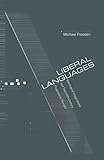Liberal Languages : Ideological Imaginations and Twentieth-Century Progressive Thought / Michael Freeden.
Material type: TextPublisher: Princeton, NJ : Princeton University Press, [2009]Copyright date: ©2005Edition: Course BookDescription: 1 online resource (280 p.)Content type:
TextPublisher: Princeton, NJ : Princeton University Press, [2009]Copyright date: ©2005Edition: Course BookDescription: 1 online resource (280 p.)Content type: - 9780691116785
- 9781400826353
- 320.51/09/04
- JC574 .F73 2005
- online - DeGruyter
- Issued also in print.
| Item type | Current library | Call number | URL | Status | Notes | Barcode | |
|---|---|---|---|---|---|---|---|
 eBook
eBook
|
Biblioteca "Angelicum" Pont. Univ. S.Tommaso d'Aquino Nuvola online | online - DeGruyter (Browse shelf(Opens below)) | Online access | Not for loan (Accesso limitato) | Accesso per gli utenti autorizzati / Access for authorized users | (dgr)9781400826353 |
Frontmatter -- Contents -- Acknowledgments -- Part One -- Introduction -- Chapter One. Twentieth-Century Liberal Thought: Development or Transformation? -- Chapter Two. Liberal Community: An Essay in Retrieval -- Chapter Three. The Concept of Poverty and Progressive Liberalism -- Chapter Four. Layers of Legitimacy: Consent, Dissent, and Power in Left-Liberal Languages -- Chapter Five. J. A. Hobson as a Political Theorist -- Chapter Six. Hobson'S Evolving Conceptions of Human Nature -- Part Two -- Intermezzo -- Chapter Seven. Eugenics and Progressive Thought: A Study in Ideological Affinity -- Chapter Eight. True Blood or False Genealogy: New Labour and British Social Democratic Thought -- Chapter Nine. The Ideology of New Labour -- Chapter Ten. Is Nationalism a Distinct Ideology? -- Chapter Eleven. Political Theory and the Environment: Nurturing a Sustainable Relationship -- Chapter Twelve. Practising Ideology and Ideological Practices -- Index
restricted access online access with authorization star
http://purl.org/coar/access_right/c_16ec
Liberal Languages reinterprets twentieth-century liberalism as a complex set of discourses relating not only to liberty but also to welfare and community. Written by one of the world's leading experts on liberalism and ideological theory, it uses new methods of analyzing ideologies, as well as historical case studies, to present liberalism as a flexible and rich tradition whose influence has extended beyond its conventional boundaries. Michael Freeden argues that liberalism's collectivist and holistic aspirations, and its sense of change, its self-defined mission as an agent of developing civilization--and not only its deep appreciation of liberty--are central to understanding its arguments. He examines the profound political impact liberalism has made on welfare theory, on conceptions of poverty, on standards of legitimacy, and on democratic practices in the twentieth century. Through a combination of essays, historical case studies, and more theoretical chapters, Freeden investigates the transformations of liberal thought as well as the ideological boundaries they have traversed. He employs the complex theory of ideological analysis that he developed in previous works to explore in considerable detail the experimental interfaces created between liberalism and neighboring ideologies on the left and the right. The nature of liberal thought allows us to gain a better perspective on the ways ideologies present themselves, Freeden argues, not necessarily as dogmatic and alienated structures, but as that which emanates from the continuous creativity that open societies display.
Issued also in print.
Mode of access: Internet via World Wide Web.
In English.
Description based on online resource; title from PDF title page (publisher's Web site, viewed 30. Aug 2021)


